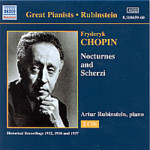
Chopin: Nocturnes and Scherzi (Rec 1936-1937)
 $35.00
Out of Stock
$35.00
Out of Stock6+ weeks add to cart
FREDERIC CHOPIN
Chopin: Nocturnes and Scherzi (Rec 1936-1937)
Artur Rubinstein (piano)
[ Naxos Historic Great Pianists / 2 CD ]
Release Date: Sunday 19 February 2006
This item is currently out of stock. It may take 6 or more weeks to obtain from when you place your order as this is a specialist product.
"Critics' Choice.' How remarkable to to have the greatest of Rubinstein's Chopin, his 1932-39 recoridngs, available on Naxos. A bargain of bargains, no more extrovert or subtly ebusive Chopin exists."
- Bryce Morrison, Gramophone, January 2002
When Artur Rubinstein died in 1982 at the age of 95, his passing severed the link to the golden age of nineteenth century pianism. In a career that lasted three quarters of a century, Rubinstein transcended the changing fashions and philosophy of performance practice without losing artistic relevance or compromising his basic musical personality. Despite being a child of the 1880s, Rubinstein's playing owed little to the 'romantic' tradition that surrounded him. His was an eclectic approach. As a musician he rejected the excesses of his older colleagues, but retained their emotional warmth and combined it with modern concepts of textual fidelity and objectivity. These qualities help explain Rubinstein's reputation as a supreme exponent of Chopin and why his recorded performances continue to hold their place in the catalogue.
Chopin's music formed part of Artur Rubinstein's cultural heritage, but although born in Lodz in 1887 and Polish by birth, he was by training a product of the great nineteenth century German school of piano playing. After some rather unfortunate experiences with inadequate teachers in Poland, Rubinstein left for Berlin under the protection of the great violinist and colleague of Brahms, Joseph Joachim. Joachim was instrumental in Rubinstein's introduction to Heinrich Barth, one of the most important pedagogues in Berlin, whose later pupils included Wilhelm Kempff. The teacher/pupil relationship was difficult. Barth attempted to lay down solid technical and intellectual principles for the young pianist, but Rubinstein rebelled against Barth's tough, Germanic discipline and was unwilling to submit to the boring but necessary technical work demanded. Despite their differences, the boy prospered and in 1899 began his professional career after a successful debut in the Great Hall of the Berlin Hochschule playing Mozart's A major Concerto under the watchful eye of Joachim. After six unhappy years with Barth, Rubinstein left Berlin in 1903 and returned to Poland. He gave a series of concerts in Paris in 1904 and travelled to America for the first time in 1906. It was not a great success. The audiences gave him a warm reception, but the critical response was far less ecstatic. Later Rubinstein would sum up the tour philosophically by explaining "I was not a prodigy any more, and I was not a mature artist. The critics were severe, much too severe. I thought I had lost America forever".


